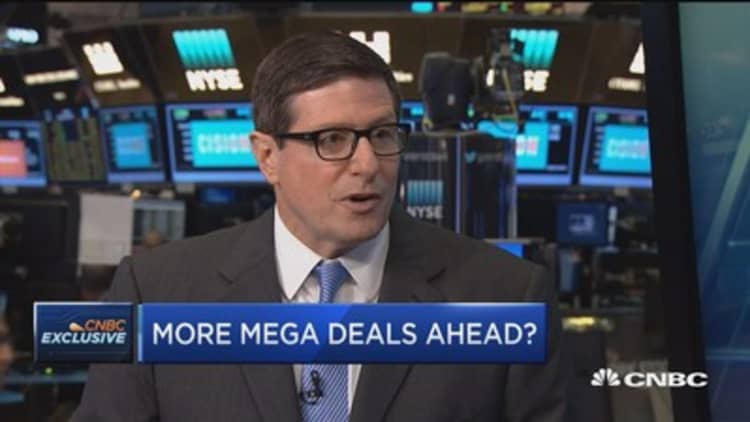
Deal-making in 2017 is off to a rough start, and according to one top dealmaker, the second half of the year is only looking worse.
Despite a few splashy deals such as Amazon and Whole Foods, global mergers and acquisition (M&A) volume for the first half of the year hit $1.59 trillion dollars—which was about 4 percent shy of 2016's half-year total of $1.66 trillion.
When singling out U.S.-targeted deals, the numbers look much more ominous, warned Citigroup's veteran banker.
"[Historically], the second half is 20 percent better than the first half, but even if we get that, we're looking at an M&A market that will be down 10 percent year-over-year in volumes," Citigroup's co-head of Global M&A Mark Shafir told Squawk on the Street Friday.
"So that question is, are we at the beginning of a secular downturn in M&A?"
US deals hit 4 year low, Europe soars
U.S.-targeted M&A is down 25 percent to $562.6 billion, the lowest total since 2013. Meanwhile, M&A in Europe has soared, up 15 percent from last year's totals.
"It's very hard to tell where we're going to go," said Shafir. "My bias is it's going to be slower. I think 10 percent down might be a pretty good result for us."
By Citigroup's estimates, if deal making in the second half of the year mimics the first, the M&A market will have decreased 40 percent from the highs of 2015.
Shafir cites two hurdles for the lackluster deal environment: Valuations and regulation. In other words, company stocks are valued too richly, and there's too much government red tape to make it all worthwhile.
"Valuations are at an all-time high. We're talking about a number just under 13x EBITDA, contrast that to 2007 it was 12.7x," said Shafir. "So we're at a very high number."
As far as regulation, Shafir says a lack of movement on tax reform and some concerns in Europe about Brexit, have also made the environment more tepid.
Still, when it comes to high valuations, Shafir still sees windows of opportunity.
"Anecdotally, what I see, talking to CEOs and boards, is that big strategic stuff has been on a list, it becomes actionable, people are still going to do [deals]" he said. "You still have very low weighted average cost to capital."
According to Dealogic, there have been 15 percent more mega-deals so far this year than compared to 2016, including Actelion's $31.4 billion dollar sale to Johnson & Johnson and CR Bard's $24 billion sale to Becton Dickinson.
"The irony is, if you look at the $10 billion plus, year over year, we're up about two deals relative to 2016—but it's not tech. The top five deals are health care and consumer, largely. And so the market has shifted."
When it comes to shareholder activism, Shafir sees no signs of letting up, citing Jana's ability to 'push' Whole Foods into the embrace of .
"The number of campaigns will be up," he said. "I don't think it's going away."



